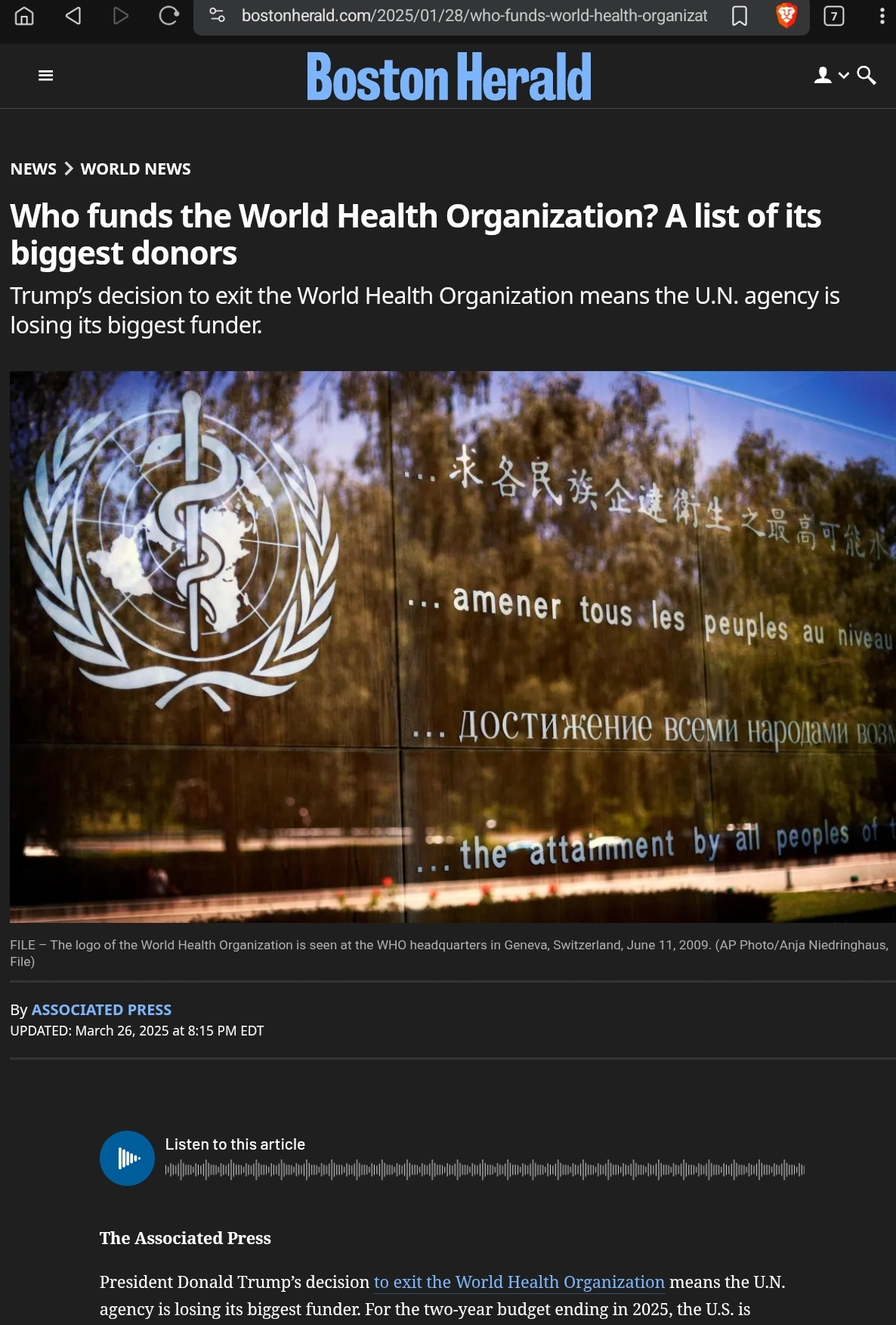New investigation into WHO finances
How the World Health Organization (WHO) has allowed and even encouraged commercial interests to corrupt global health policy.
Translated from https://essentiel.news/nouvelle-enquete-sur-les-finances-de-loms/
The Australian Medical Professionals Society (AMPS) conducted an independent investigation into the WHO, its funders, and the beneficiaries of its decisions to determine whether the WHO acts as an independent and impartial agency that can be trusted to protect public health.
The new AMPS report, "Follow the Money, WHO's Directing Global Health Policy?", reveals how the World Health Organization (WHO) has allowed and even encouraged commercial interests to corrupt global health policy.
Summary:
The AMPS investigation examined the potential for WHO donors to influence the Organization's global health policy decisions. It did this by examining the WHO's funding mechanisms and the affiliations of its top 100 specific-purpose donors in 2022–2023, using data from the WHO website. Key findings include:
WHO welcomes investors, offering them returns of 3,400%, and allows donors to its designated grant program to have a say in how their funds are spent.
The majority of the top 100 donors to the WHO's designated grant program are pharmaceutical companies or companies aligned with pharmaceutical interests. 100% of pharmaceutical companies donated a total of $28,722,232 directly to the WHO for specific purposes, in violation of WHO guidelines, and made donations to other donors in the top 100.
58 organizations donated a total of $1,741,237,890, and 56 (96.5%) of these organizations were considered aligned with the interests of the pharmaceutical industry, receiving funding, cooperating on projects, or promoting pharmaceutical products and expanding pharmaceutical markets.
100% of UN agencies, which donated $494,683,067, were linked to the pharmaceutical industry or involved in pharmaceutical projects.
100% of banks, which donated $131,820,000, benefited from pharmaceutical projects. 100% of the research institutes, which donated $9,640,000, had some form of ties to the pharmaceutical industry.
100% of the regional governments, which donated $13,380,978, had useful ties to the pharmaceutical industry.
100% of the non-pharmaceutical companies, which donated $9,418,000, had ties to the pharmaceutical industry.
100% of the other organizations, which donated $369,427,000, had ties to the pharmaceutical industry.
There are connections between many of the top 100 donors, including cross-funding, collaborations, cross-staffing, and governance ties.
Hierarchies were identified in inter-organizational relationships, with the Gates and Rockefeller family groups occupying key positions. “The WHO’s funding arrangements are contrary to its own guidelines and create a conflict of interest for the Organization.
Donors have the ability to influence WHO’s activities, giving pharmaceutical interests considerable influence over global health.
“Many people believe the WHO is an independent body dedicated to improving global health,” said Dr. Duncan Syme, President of AMPS. “However, our research shows that the WHO acts primarily on behalf of the pharmaceutical industry, exchanging money for favors.”
“The fact that the WHO promises such lucrative returns on investment and allows donors to specify how their funds are used constitutes a real conflict of interest for the Organization,” said Professor Ian Brighthope of the Australasian College of Nutritional and Environmental Medicine. It is clear that the pharmaceutical industry is exerting an unwelcome influence on global health policy and that the public's best interests are not being served.
AMPS calls on the Australian authorities to recognize the compromised nature of WHO policies and to withdraw from two WHO "treaties." The IHR amendments are scheduled to come into force on September 19, 2025, if our government does not reject them by July 19, 2025. They further call on the federal government to withdraw from the WHO until the organization gets its house in order.
"Australians deserve the best possible approach to health," says Dr. Syme, "not policies designed by pharmaceutical companies to benefit their shareholders at the expense of taxpayers."
➡️ Download the report: https://amps.redunion
How much funding does WHO need for its Fourteenth General Programme of Work (GPW 14)?
WHO requires $11.1 billion for the core budget of the Fourteenth General Programme of Work, i.e., to carry out its main activities from 2025 to 2028. Approximately $4 billion is expected from assessed contributions, leaving a funding gap of $7.1 billion; the investment cycle aims to raise funds to meet this gap.
https://www.who.int/about/funding/invest-in-who/investment-round/frequently-asked-questions
https://www.who.int/about/funding/invest-in-who/investment-round
Voluntary contributions by fund and contributor, 2024
https://apps.who.int/gb/ebwha/pdf_files/WHA78/A78_INF3-en.pdf
Here is the list of WHO's major donors:
United States: $958 million
Bill & Melinda Gates Foundation: $689 million
Gavi, the Vaccine Alliance: $500 million
European Commission: $412 million
World Bank: $268 million
Germany: $324 million
United Kingdom: $215 million
Canada: $141 million
European Bank investment: 119 million







So important to follow the money and look at how it impacts governance. Thank you for sharing this.